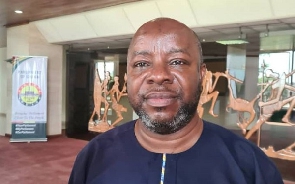The Member of Parliament for Upper Denkyira East, Dr Festus Awuah Kwofie, has urged the urgent need for Ghanaians to develop a taste for the consumption of local produce, especially local rice, to reduce the country’s import burden.
According to him, the continuous dependence on imported food items such as rice, meat, and palm oil with huge sums of the dollar is partly responsible for the weakening of the Ghana cedi and called for a shift in the crave for foreign products.
Dr Festus Awuah Kwofie made the call on the floor of parliament during his contribution to the motion in thanksgiving to the president for delivering a statement on the State of Nation.
The lawmaker noted that President Akuffo Addo during his delivery admitted the need for the country to reduce its import bill, especially for goods that can be produced locally.
“The President indicated one, that we need to reduce our import bills, last two years, the import bill for the country was 7.6%, within two years it has gone up by 13.6 billion, if that were to be investment flow, fine, but essential commodities like rice, meant, oil even wood, we import into this country” he indicated.
The Upper Denkyira MP also provided statistics on imports that are not helping the nation and urged the urgent need for the country to halt such imports.
Mr Speaker, let me just give you a few statistics of things we import into this country that is not helping us, Rice and cereals-$522 million, chicken and fish- $571 million, meant -$35 million, vegetables-$34.9 million, we have wood-$297 million, wheat -$139 million and palm oil – $136 million.
“Why do we have to increase our import for rice? We need to develop the taste for our local rice, that is the only way we can reduce the pressure on the cedi.
We have colleagues here who are into rice cultivation, I know Hon Akando is into it, we have our former deputy minister for roads and highways, Dr Odoom who is also into rice production and we have few of them into rice production, why do we want to develop taste for foreign products”? Dr Awuah Kwofie asked.
The lawmaker also indicated the president acknowledged high inflation rate, the weakened cedi and the ongoing debt exchange program as challenges facing the economy and is working on some measures to address them.
He indicated that Ghana’s inflation has moved from 7.8% in 2020 to about 10% in December 2021 and rose through to 54% by the end of 2022 due to several factors including inflation and imports as discussed.
The MP blamed the almost 100% depreciation of the Ghana cedi due to imports, high import of oil prices, COVID-19 pandemic and the Russian-Ukraine war as factors affecting the high inflation rates recorded.
He indicated that a reduction in import bills, increase local capacity to produce certain products including rice and other cereals as mentioned by the President is a way of finding a solution to the inflationary challenge.
Dr Festus Awuah Kwofie also debunked claims by the minority that, Ghana’s inflation went high as a result of Bank of Ghana’s decision to print more monies into the systems and explained that the president gave the reasons for the hike.
He explained that the four different conditions under which the Bank of Ghana prints notes including the replacement of mutilated notes, as an equivalent percentage to equal growth in Gross Domestic Product (GDP), to guard against turbulence occurrences and as cedi designated loans used for the purchase of cocoa, the reserves of which he said is used to support the country.
The MP further enumerated several developments chalked by president Akuffo Addo in the construction and housing sectors of the economy and the launch of a rental scheme for the vulnerable.
YNA/OGB
General News of Wednesday, 15 March 2023
Source: www.ghanaweb.com

















